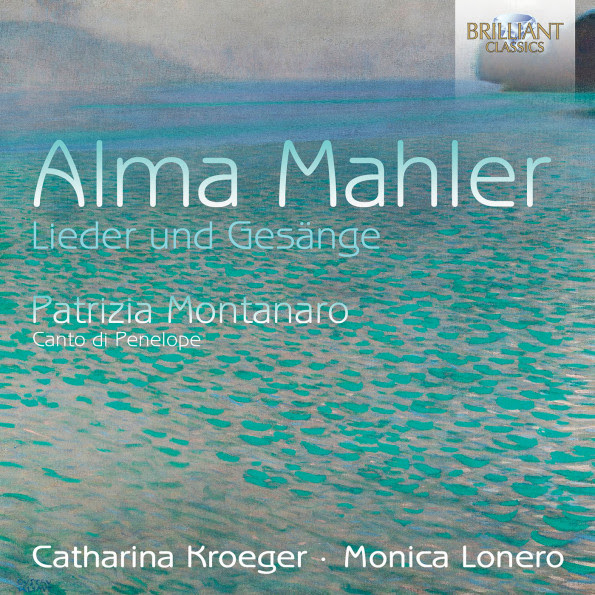
A. MAHLER: 5 Lieder: Die stille Stadt; In meines Vaters Garten; Laue Sommernacht; Bei dir ist es traut; Ich wandle unter Blumen. 4 Lieder: Licht in her Nacht; Waldseligkeit’ Ansturm; Erntelied. 5 Gesange: Hymne; Ekstase; Der Erkennende; Lobgesang; Hymne an die Nacht. MONTANARO: Canto di Penelope / Catharina Kroeger, soprano; Monica Lonero, pianist / Brilliant Classics 95469
Alma Schindler-Mahler-Werfel-Gropius, extraordinarily talented, beautiful, and as randy as a cat in heat, was one of the most admired and reviled women in Western Europe. She was admired for her beauty, intelligence, and the fact that she managed to land three of the greatest geniuses of her time as husbands, but reviled for her guttersnipe sexual habits and essentially cold personality. When she died, satirist Tom Lehrer wrote a song about her:
Alma, tell us,
All modern women are jealous;
For the ducks always envy the swans
Who get Gustav and Walter and Franz!
Listening to the songs on this album, it’s easy to hear what Gustav Mahler saw in her. Her music was, like his, in that late-Romantic-bordering-on-modern style, essentially tonal yet with several unexpected turns of harmony, yet they don’t really sound like Mahler’s music at all. Rather, they sound like Brahms if Brahms had lived another decade and been influenced by some of the newer, more experimental music around him. They are generally more melodic than Gustav’s lieder, but her aesthetic took a different course. Whereas Gustav let the melody lead the harmony, Alma made the harmony lead the melody writing. This makes her songs a bit less memorable than her future husband’s Songs of a Wayfarer or Des Knaben Wundrhorn, yet no less remarkable for their individuality and ingenuity.
In Ansturm, for instance, Alma begins with sharply-attacked piano chords, which then lead into the typically ambiguous melody, which is then developed as if it were a string quartet movement, the audacious piano part changing not only the base key but also chord positions within those keys, and the melody tags along behind. And all of this in a compact one minute and 41 seconds!

The interesting thing about these songs is that, when Gustav Mahler married Alma, he made her completely give up her musical career: “There is room for only one composer in this marriage,” he told her. She obeyed for a while but, as the dates on these songs prove, not for long. The first group of songs was composed in 1910, when Mahler was still alive, and the last group in 1924, 13 years after her husband’s death. Curiously, only one of her songs, Der Erkennende or Recognition, is based on the poetry of one of her famous husbands, Franz Werfel. Maybe she was having affairs with some of the other poets whose work she used. Who knows?
It’s also quite good that soprano Catharine Kroeger has a very pretty, if light, soprano voice, and that she at least sings with energy and enthusiasm if not with much interpretive insight. In other words, she brings the music to life in an energetic way without really getting too deeply under the skin of the lyrics.
And then, when the songs are done, there is something completely different: an extended Song of Penelope by modern composer Patrizia Montanaro (b. 1956). This is music in the mold of someone like Ghedini, modern Italian music using advanced harmonies yet still retaining a lyrical flow and a recognizable melodic structure. Montanaro is one of those composers for whom the melody and harmony move together, with neither very obviously leading the other. She seems, rather, to be trying to convey the expression of the words through music, thus whatever shape the melody and harmony take are dependent upon the mood. The text was written by Rosaria Lo Russo and seems but loosely based on the legend of Penelope from ancient times, expressing some of her inner turmoil and anger at Odysseus’ return after 20 years of absence. Here’s a bit of it:
I peel off this rind that’s holding me in
and I skip and jump
in your squares I play hopscotch
trying not to step on a line
trying not to get myself jinxed
by overstepping my chaste commitments
For twenty years I’ve been crossing myself
and packing your things away for safekeeping
in a rind of composure, a rind of displeasure
and the maid at my heels seals up the preserves.
As the character’s silent mental conversation with herself continues and the moods skip and jump around, so too does the melodic line. It’s not a piece for everyone, but I found it extraordinarily interesting…sort of like an Italian version of La Voix Humaine.
All in all, a surprising and refreshing release. If you enjoy late-period German Romantics, you need to get this.